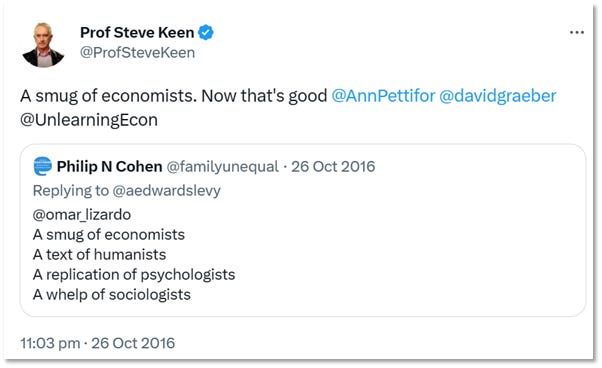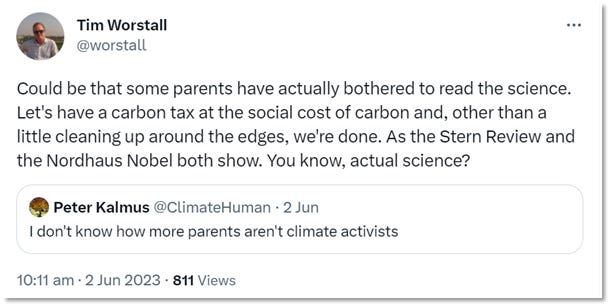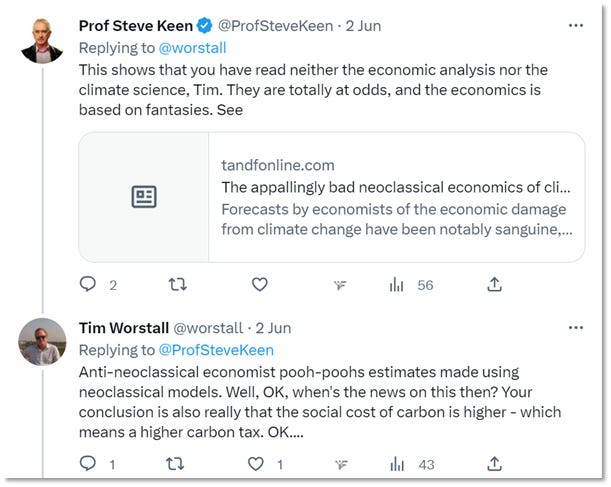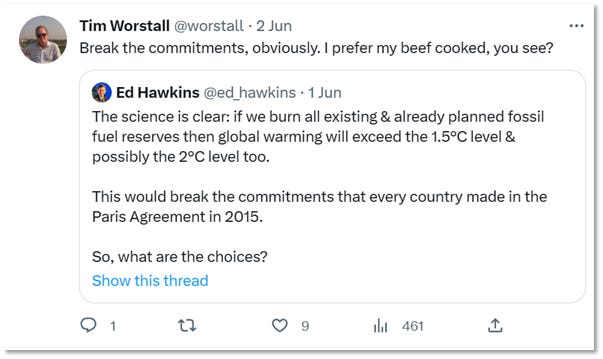Mainstream economists are professional trolls
Steve Keen is a Distinguished Research Fellow, Institute for Strategy, Resilience & Security, UCL
Cross-posted from Steve’s website Building a New Economics
By this, I don’t mean that mainstream economists work in troll farms and are being paid by Putin—though it would be better for humanity if they were: they’d do far less damage. I mean that, almost to a person, they behave as trolls when debating critics of economics, and when discussing issues that, to their mindset, can only be solved by economic theory. They ridicule their opponents rather than engaging with them, because, like trolls, they are smugly confident that their critics couldn’t possibly be right.
Philip N Cohen (@familyunequal) used this insight to come up with the perfect collective name for a group of economists: A “smug” of Economists:

They are smug because they believe that mainstream, “Neoclassical” economics is an accurate model of the real world, and therefore anyone who criticises it must be wrong.
This smugness would merely be infuriating if they were just trolls, with nasty attitudes but no real power. But in fact, they do have power: though they’ll frequently complain that politicians don’t listen to them enough, the majority of advisors to politicians are economists, and most decisions taken by politicians follow mainstream economic advice. Their smugness therefore leads them to dismiss sound criticism, and that locks in bad policy based on either bad theory, or bad work by other Neoclassical economists.
I experienced two instances of their smugness last week on (where else?) Twitter, via the Londoner Tim Worstall (@worstall) on climate change, and an anonymous New Zealander “Econgrad” (@Econgrad5143), on the role of money in economics.
Worstall trolled Peter Kalmus for saying that “I don’t know how more parents aren’t climate activists“, with the claim that all we need is a carbon tax, citing both Lord Stern and “Nobel Prize” winner Nordhaus as examples of “actual science”.

Worstall probably neither knew nor cared that Peter Kalmus in fact is a climate scientist (see https://en.wikipedia.org/wiki/Peter_Kalmus_(climate_scientist)). But he also clearly does not know that Nicholas Stern is a critic of Nordhaus’s work on climate change. In fact, in a recent open-access paper “A Time for Action on Climate Change and a Time for Change in Economics“, Stern directly rejects Worstall’s advice:
the suggestion that ‘theory says’ that the carbon price is the most effective route is simply wrong and involves a number of mistakes. (Stern 2022)
I tried to alert Worstall to the fact that Nordhaus’s work is dangerously misleading, and he rejected my warning because, hey, I’m a known critic of Neoclassical economics:

So a critic must be wrong, because he’s a critic? Well, here is Lord Nicholas Stern on precisely the same point:
a recent version of the DICE model estimates losses of 8.5% of current GDP at a global temperature rise of 6°C. If this were plausible, there would be little cause for concern about climate change because 6°C of warming will not be reached, even with bad luck, probably for over 100 years, by which point, with a modest amount of economic growth, losing less than 10 percentage points of GDP would be of minor significance in relation to GDP which had more than doubled (at say an underlying growth rate of 1% per annum).
But a 6°C temperature rise would likely be deeply dangerous, indeed existential for hundreds of millions, or billions, of people. It could be a world that could support a far lower population, and we could see deaths on a huge scale, migration of billions of people, and severe conflicts around the world, as large areas, many densely populated currently, became more or less uninhabitable as a result of submersion, desertification, storm surge and extreme weather events, or because the heat was so intense for extended periods that humans could not survive outdoors. It is profoundly implausible that numbers around 10% of GDP offer a sensible description of the kind of disruption and catastrophe that 6°C of warming could cause. (Stern 2022. Emphasis added)
My paper “The appallingly bad neoclassical economics of climate change” (Keen 2020), which Worstall claims to have skimmed, explains how Nordhaus generated these profoundly implausible numbers, and ironically, Neoclassical economics itself was not guilty. In fact, other Neoclassical economists, such as Robert Pindyck, have noted that the function in Nordhaus’s DICE model that purports to show the relationship between global warming and GDP “is made up out of thin air. It isn’t based on any economic (or other) theory or any data” (Pindyck 2017, pp. 103-104).
Ignorant of all this, and with the confidence of a troll, Worstall regularly attacks climate scientists, and dismisses warnings about the dangers of climate change:

Our beefs will quite probably be well and truly be cooked by global warming, thanks in part to the smug trolls of Neoclassical economics, and the appallingly bad work that they witlessly defend.
Keen, Steve. 2020. ‘The appallingly bad neoclassical economics of climate change’, Globalizations: 1-29.
Pindyck, Robert S. 2017. ‘The Use and Misuse of Models for Climate Policy’, Review of Environmental Economics and Policy, 11: 100-14.
Stern, Nicholas. 2022. ‘A Time for Action on Climate Change and a Time for Change in Economics’, The Economic Journal, 132: 1259-89.



Be the first to comment